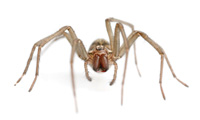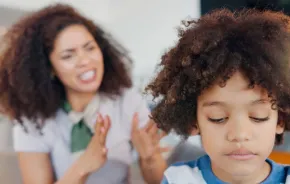 My children have always loved drive-through car washes — the brushes surrounding the car, the water pounding against the windows. So a few years back, while taking care of a friend’s 3-year-old son, I did not think twice about cleaning the car on the way home.
My children have always loved drive-through car washes — the brushes surrounding the car, the water pounding against the windows. So a few years back, while taking care of a friend’s 3-year-old son, I did not think twice about cleaning the car on the way home.
Little Jackson — a mini rock star who exudes confidence and spunk — was terrified. The loud noise, the feeling of claustrophobia — the poor guy was hysterical. And because he was strapped into the car seat with no escape, he was subjected to that horror for a full minute and a half. I was mortified about what I might have done to him.
Preschoolers have all kinds of fears and phobias that experts consider perfectly normal: fears of loud noises, imaginary creatures or monsters, being alone, natural disasters, just to name a few. Most children will eventually outgrow them. But in the meantime, parents can help their children learn to keep phobias from limiting their lives.
What causes phobias?
As a child’s brain develops, she begins to understand consequences and may develop a fear of something that has never been a problem in the past, says Dr. Wanjiku Njoroge, a pediatric psychiatrist at Seattle Children’s. A child who handled immunizations well as a 2-year-old may grow into a 4-year-old who not only screams at the sight of a needle, but becomes stressed just driving by the doctor’s office.
Parents of preschoolers may wonder what triggers a certain phobia; why is the child terrified of a natural disaster when he has never actually experienced one? “They are afraid of things they don’t understand,” says Njoroge. “This is why we’re concerned with TV watching. They hear about the devastation, even if they are not the primary viewers. We saw it a lot after [last year’s earthquake in Haiti] — the bodily injury, the loss of parents, earthquakes — these were things children heard about and feared.”
Njoroge says that when a phobia leads to irrational behavior, a parent will want to get involved. Let’s say a child has been bitten by a dog. According to Njoroge, a subsequent fear of dogs would be natural (and as she points out, part of a human’s survival instinct), but if the child then becomes afraid of going to all parks or going outside for a walk, that phobia has crossed over to irrationality.
 How to help
How to help
How can parents begin to address their child’s phobias? Keep it playful, suggests Njoroge. In the case of the child bitten by a dog, Njoroge suggests parents try play therapy. Allow the child to act out with stuffed animals a dog that attacks all the other animals, maybe even biting cars or other objects. Say to them, “Dogs can be scary! What should you do?” and search for solutions together. Or, “I wonder why that dog is hurting everybody?” To which the child may respond, “All dogs are mean,” which provides a perfect opening for a parent to connect. Offer stories of your own about dogs that are cuddly and furry and don’t hurt people.
And check your own phobias, suggests Njoroge, who works with entire families when treating a child for a phobia. This is because a “dynamic loop” may have developed, with a parent unknowingly reinforcing the child’s fear. “So we might say to the parent, ‘I know it was scary for you seeing your 3-year-old mauled by a pit bull,’” says Njoroge. “So we ask them, ‘Are you concerned about going to the park?’”
Oregon author and trauma expert Debra Whiting Alexander writes that parents and caregivers should give kids their undivided attention whenever children are ready to talk about their fears. “Remember to respond rather than react. If you’re angry, shocked, blaming . . . your children will not trust you to understand” and may actually stop talking, writes Alexander in her book Children Changed by Trauma: A Healing Guide.
Jennifer Hatters, a professional nanny of 25 years who lives in Maple Valley, has talked many of her charges through fears of the dark, monsters and loud noises. She has found success in having relaxed conversations during the daytime hours about what is scary to them. “Be validating and understanding,” Hatters recommends. “Don’t just say, ‘There’s nothing to be afraid of,’ because then they suffer silently.”
One of Hatters’ families had three boys of varying ages, and the two older ones took pleasure in scaring the youngest, who was then 4. They told him that zombies were going to eat his brain. Hatters had a calm and casual discussion, explaining that zombies don’t really exist. Her approach was so effective that later that year, the boy decided to be a zombie for Halloween.
Most of the time, professional help is not necessary. With the right support at home and the passage of time, most children will outgrow their fears.
By the time he went off to kindergarten, Jackson was fine with automated car washes. And now, nine years later, one this 12-year-old’s favorite places is the Great Wolf Lodge water park, his fear of water torrents and loud noises long outgrown.
Hilary Benson has covered parenting and education issues for print and television. She lives in the Seattle area with her family.











